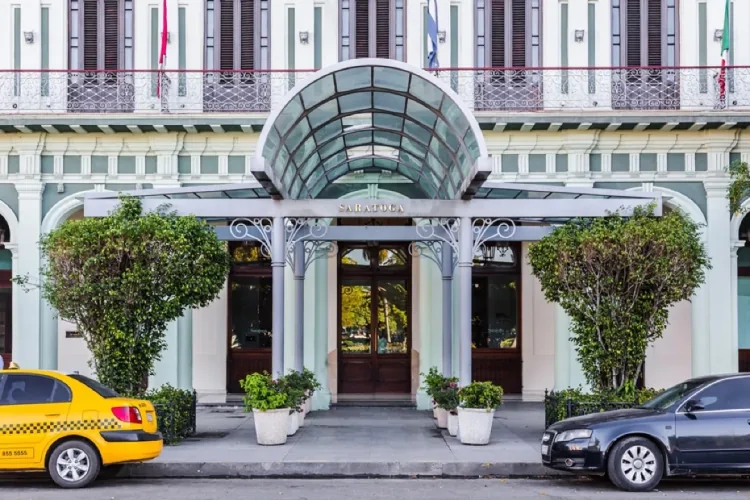HAVANA, Cuba.- Not 20 days have passed since tragic event from the Saratoga hotel, and no one in this tropical dictatorship seems to remember what happened anymore. The Cuban people, always in a hurry to forget and let go of duels so as not to add more sorrow to their daily bitterness, seem to have chosen to remain silent and stop questioning what will follow after the “unfortunate accident” that left 46 dead and several injured.
The relatives of the victims have also decided to remain silent, except for one who has dared to ask for an explanation from the regime that owns all the hotels and buildings in Cuba, whatever their condition. Scattered news arrives from the ruling party about the investigation that is being carried out, the construction of houses for the victims in areas far from their destroyed homes, and the intention to grant pensions -provisional or definitive- to all those affected by the incident.
The word “compensation” evaporated amid the mournful poignancy of the regime’s spokesmen, the inevitable politicization of the event and the constant reminder that the victims have been treated in the Cuban health system, with emphasis on its apparent free nature.
Similar arguments accompanied the crash of the Boeing 737 in the surroundings of the “José Martí” International Airport on May 18, 2018. A total of 112 lives were lost in that horrible accident, of which only the young Mailén Díaz Almaguer survived. Various investigations later revealed that the crashed aircraft had been in operation for almost forty years, and that the Mexican company Global Air had been penalized for several security incidents, an alert that was deliberately ignored by Cubana de Aviación.
The plane crash, like the explosion of the Saratoga, occurred under the direct responsibility of the regime without knowing who, or who, will be responsible for so many annihilated lives and broken families. The same thing happened in 2020, when a balcony fell off and killed three girls from the Jesús María neighborhood; another perfectly avoidable accident that was succeeded by an investigation. However, the subject has never been discussed again, nor who was to blame for not demolishing a structure that was life-threatening in time.
Like that balcony, walls, parapets and ceilings have fallen, causing fatalities that go to the State’s account. This will continue to happen because everything in Havana is a death threat due to collapse. In the Housing offices, hundreds of reports from neighbors alerting the authorities of the danger that hangs over them in their own homes are shelved, as well as architectural reports where buildings are declared uninhabitable and are falling apart while they wait for the only demolition crane that the semi-destroyed capital of all Cubans has.
The same regime that allowed the advance of the deterioration of the Havana housing fund, today wants to shake off the problem so as not to be the target of criticism, because the justification for the blockade has lost all credibility in the face of the advance of the hotel agenda. No official assumes responsibility for the dead and wounded, nor do the victims or their mourners receive adequate compensation beyond what is stipulated in the Social Security Law, almost nothing considering that such benefits are paid in devalued Cuban pesos.
The “revolutionary shame” comes to the fore of those who demand fair compensation for those affected by the explosion of the Saratoga, alleging that the money will not bring back the deceased. But the issue is not money, but the demand for responsibility in the face of tragedies like that. No financial compensation can mitigate the pain of loss, but it serves to remind companies that negligence pays dearly, and that citizens are not willing to allow their lives to be cut short with impunity.
The fact that the multimillionaire conglomerate GAESA – owner of the Saratoga since 2021 – has not expressed any intention other than “being on the side of the victims”, while planning to rebuild the hotel in the shortest possible time, expresses what they are worth. people for this regimen.

The disdain of the government is not new, nor is the rush of the people to forget. The Cuban people sense that more tribulations are coming, derived from the war and the economic crisis, and also from these copious rains that soften the foundations of buildings that have yielded much more than expected.
“Something good will bring the Saratoga to those who survived,” a neighbor ironizes as she hangs out several items of clothing on her propped-up balcony in the Jesús María neighborhood. She knows that the hotel explosion has turned the world upside down. “Those who lost everything are going to be given a house, anywhere, but they are going to be given it. We are screwed in these little rooms that no one cares about.”
And he’s right. When her building collapses, if she survives, she will end up in a shelter -if there are capacities available- probably until the end of her days, because the list of entire families waiting for a home or premises has not stopped increase in recent years.
The neighbors who die under the rubble will be mourned and it’s over. The lack of maintenance of the Havana construction heritage is not the responsibility of anyone. Here, where supposedly everything belongs to everyone, it is difficult to assign blame and obtain justice. The dictatorship loses nothing by waiting for new misfortunes to bury the previous ones, and with them any intention to investigate, hold responsible, compensate. Nothing fuels impunity as much as the bad memory and silence of the victims.
OPINION ARTICLE
The opinions expressed in this article are the sole responsibility of the issuer and do not necessarily represent the opinion of CubaNet.
Receive information from CubaNet on your cell phone through WhatsApp. Send us a message with the word “CUBA” on the phone +1 (786) 316-2072, You can also subscribe to our electronic newsletter by giving click here.






